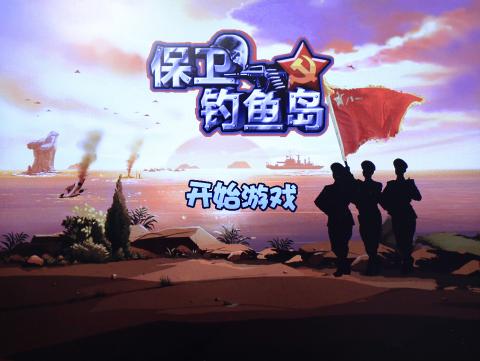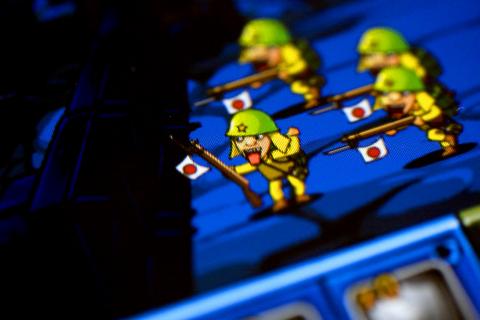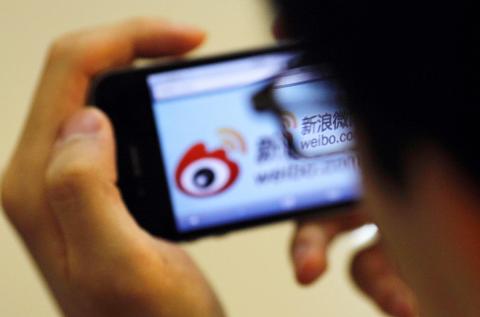When China’s Communist Youth League celebrated its 90th birthday, it employed a tactic unavailable to President Hu Jintao (胡錦濤) when he used the organization to propel his career: a microblog promotion.
Kids were urged to post “micro-stories” online in May, sharing cherished moments in the Communist Youth League, with the best submissions to be compiled in a book. “The little badge I got still looks so shiny to me now,” one entry read.
The promotion was part of an outreach to the country’s 538 million Internet users that’s seen the youth wing take stakes in online gaming companies. Underlying the campaign: angst in China’s Communist Party months before a once-in-a-decade leadership handover that it’s increasingly out of step with the nation’s status as the world’s No. 2 economy.

Photo: Bloomberg
“One of the critical weaknesses of the party is that today it attracts people who are unlikely to make the party stronger as a political organization,” said Pei Minxin, a government professor at Claremont McKenna College in California. “They want to take advantage of the party without actually contributing to the party’s well-being.”
The youth wing decades ago fueled the careers of Hu, 69, who is forecast to start handing over his titles to Vice President Xi Jinping (習近平), 59, later this year, and of Vice Premier Li Keqiang (李克強), who turns 57 this month and is targeted as the next premier.
Online Gaming

Photo: Bloomberg
Now, the Communist Youth League is an investor in online entertainment. It partnered with Chinese gaming firm PowerNet Technology in 2005 to develop a game in which players repel Japanese invaders during World War II, harking back to one of the most celebrated chapters in party history.
The Youth League’s investment arm owns a stake in PowerNet subsidiary Shenzhen Zhongqingbaowang Network Technology Co., known as Shenzhen ZQ, according to data compiled by Bloomberg.
Rather than as a source of ideological inspiration, China’s young have flocked to the party as a networking tool and resume builder in an economy dominated by state-owned enterprises.

Photo: Reuters
“The reality here is we have to focus on our own career path,” said Brook, a 23-year-old party member who refused to give her Chinese name for fear of punishment from the government. “Ten to 20 years ago people really wanted to join. Now it’s not ‘We want to,’ but ‘We have to.’”
Membership Rising
Membership numbers bear out Brook’s impression: in 2011, the party expanded 2.9 percent to 82.6 million people. One in four were under the age of 35, up 0.7 percentage points from 2011, according to data released on state-run Xinhua News Agency June 30. Demand to get in was high, with an 85 percent rejection rate, according to the figures.
Numbers aside, the leadership has signaled concern that ideological commitment among the younger generations is lagging behind, endangering the long-term prospects of Mao Zedong’s (毛澤東) party.
Looking to blunt western influences, the party outlawed shows such as the American Idol-inspired singing competition Super Girls and banned western programs from appearing between 7pm and 10pm in February. At the same time, it’s produced its own entertainment appealing to kids.
Shenzhen ZQ made Defend the Diaoyu Islands, in which players must defend against invading armies of sumo wrestlers, ninjas and rifle-toting soldiers. China and Japan dispute sovereignty of the islands, which are known as the Senkaku in Japanese. Apple Inc’s App Store, which bans racist games, has pulled the item.
Comrade Lei
Other efforts rely on another staple of Chinese propaganda: Lei Feng (雷鋒), a soldier who died at age 21 in 1962 and is brandished by older generations as a symbol of selflessness.
In November 2011, the Youth League Central Committee released a 26-episode cartoon series dubbed The Bugle featuring party history, including well-known Chinese slogans such as “A spark can kindle a great fire” and “Learn From Comrade Lei Feng.”
Even as government censors block Facebook, Twitter and other Internet content, party officials have also taken to blogging. It’s fertile ground: Of China’s 538 million Internet users at the end of June, 57 percent — about the population of the entire US — were under 30 years old.
“They’re trying to do more and going on the offensive and not let young people sit there passively to receive information only from the West,” said Wang Feng (王豐), director of the Brookings-Tsinghua Center for Public Policy in Beijing. “Both the current outgoing leadership and incoming leadership are keenly aware of the need to establish political legitimacy.”
Populist Appeal
The second most popular government official on Sina Corp’s Weibo microblog service is Wu Hao, a former Xinhua News Agency journalist who is now a propaganda official in Yunnan Province and has more than 1.8 million Weibo followers, according to data compiled by Bloomberg.
Wu has posted about 12,000 times since Dec. 1, 2009, boasting about his frugality and preference for 10-yuan ($1.57) cigarettes, a contrast to other party members spied wearing designer clothes at the National People’s Congress in March.
“I never wear big brands, I eat very simple foods, I stay at home after work and smoke cheap cigarettes,” he wrote. “I think that’s a normal life.”
Guangdong Province Communist Party Secretary Wang Yang said in an online chat — itself a sign of change — that he surfs Weibo “every day, and I usually see people criticizing me.”
Out of Touch
Employing new methods of publicizing the party’s old messages may not go far enough to buttress public legitimacy in a country lacking elections for national office.
“The modernization effort has very limited impacts — the games for iPhone and iPad can only lure simple-minded middle school and college students,” said Willy Wo-Lap Lam, an adjunct professor of history at the Chinese University of Hong Kong. “It’s very easy to see that the government is using a new package to get on with its old propaganda program. It won’t have any effect on anyone who is capable of independent thinking.”
The state-run People’s Daily hinted last year that some leaders may be getting the message.
“An important project lies in front of the party 90 years after its founding,” the newspaper said at the time. “That is, how to make the new generation who grew up in the Internet era with pop music and Hollywood movies to be happy to accept and learn ‘red history?’ Obviously, the traditional rigid propaganda preaching gets nowhere.”
Public Disconnect
The new-media outreach coincides with signs of public discontent with the outsized wealth and influence of some party members, exemplified by ousted Politburo member Bo Xilai (薄熙來), whose wife has been accused of involvement in the murder of a UK citizen with whom she had business ties.
President Hu, in a speech marking the party’s 90th anniversary last year, said the party must recruit people of integrity “on merits without regard to their origins” and make sure that “those who seek personal gain by acting in a calculating way and currying favor gain nothing.”
Meantime, other officials trumpet the party’s efforts at modernity as a success.
“We have made some new breakthroughs in the areas of Internet radio, animation, games, micro-film-making productions,” Lu Hao (陸昊), first secretary of the Youth League Central Committee, said in March. The party’s youth wing should use “new media and fashionable means,” he said.
The mix of the historical and the modern is on display at the museum in Shanghai celebrating the 1921 birth of China’s Communist Party, where visitors admire wax statues of Mao and his fellow party founders. On stand-up touchscreen displays, they can check mobile phone ads, browse the online version of the People’s Daily, and read microblog updates.
“It’s very good the Party is using Weibo and technology to teach young people about its history,” said Jiang Linlin, 23, a Shanghai University student who was volunteering at the museum and said she has pledged to become a member. “I love China and joining the Party shows your dedication and also helps you to find a good job.”

May 18 to May 24 Pastor Yang Hsu’s (楊煦) congregation was shocked upon seeing the land he chose to build his orphanage. It was surrounded by mountains on three sides, and the only way to access it was to cross a river by foot. The soil was poor due to runoff, and large rocks strewn across the plot prevented much from growing. In addition, there was no running water or electricity. But it was all Yang could afford. He and his Indigenous Atayal wife Lin Feng-ying (林鳳英) had already been caring for 24 orphans in their home, and they were in

On May 2, Chinese Nationalist Party (KMT) Chairman Eric Chu (朱立倫), at a meeting in support of Taipei city councilors at party headquarters, compared President William Lai (賴清德) to Hitler. Chu claimed that unlike any other democracy worldwide in history, no other leader was rooting out opposing parties like Lai and the Democratic Progressive Party (DPP). That his statements are wildly inaccurate was not the point. It was a rallying cry, not a history lesson. This was intentional to provoke the international diplomatic community into a response, which was promptly provided. Both the German and Israeli offices issued statements on Facebook

Even by the standards of Ukraine’s International Legion, which comprises volunteers from over 55 countries, Han has an unusual backstory. Born in Taichung, he grew up in Costa Rica — then one of Taiwan’s diplomatic allies — where a relative worked for the embassy. After attending an American international high school in San Jose, Costa Rica’s capital, Han — who prefers to use only his given name for OPSEC (operations security) reasons — moved to the US in his teens. He attended Penn State University before returning to Taiwan to work in the semiconductor industry in Kaohsiung, where he

President William Lai (賴清德) yesterday delivered an address marking the first anniversary of his presidency. In the speech, Lai affirmed Taiwan’s global role in technology, trade and security. He announced economic and national security initiatives, and emphasized democratic values and cross-party cooperation. The following is the full text of his speech: Yesterday, outside of Beida Elementary School in New Taipei City’s Sanxia District (三峽), there was a major traffic accident that, sadly, claimed several lives and resulted in multiple injuries. The Executive Yuan immediately formed a task force, and last night I personally visited the victims in hospital. Central government agencies and the